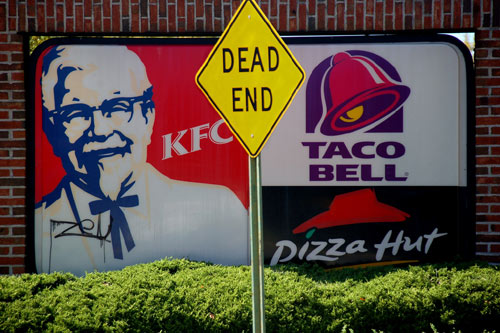當(dāng)前位置: Language Tips> 雙語新聞
Stop eating fast food: Why fast food is slowly killing you
分享到

|
Eight in 10 Americans eat fast food at least once a month and half eat it every week according, to a Gallup Poll. Yet most people who eat fast foodknow it’s bad for them. So why do they keep eating it? The answer is simple: the benefits of eating fast food outweigh the long-term implications for most people. However, once you read these reasons why all those trips to the drive through may be slowly killing you, you may just want to stop eating fast food after all. 1. Fast food makes you fat. A 15-year study of over 3,000 people found that eating fast food is linked to weight gain and insulin resistance. In others words, fast food makes you fat and increases your risk of type 2 diabetes. You probably know this already. But here’s something you may not know— 2. Fast food is addictive. The more you eat fast food, the more you crave it. One study found that fast food is “a potentially addictive substance that is most likely to create dependence in vulnerable populations.” If you eat fast food once a week or more, you may be addicted to it. 3. Fast food eggs are definitely not the breakfast of champions. Breakfast sandwiches at fast food restaurants are a true modern marvel of chemistry. The “egg” sandwich at Subway, for example, has ingredients like glycerin, which is found in soap, and dimethylpolysiloxane, a type of silicone found in Silly Putty and many lubricants. 4. Fast food is affecting your kids. According to the CDC, childhood obesity has more than doubled in children and tripled in adolescents in the past 30 years. Kids have an amazing ability to recall ads they’ve seen. Fast food marketers know this, and design ads accordingly. Research shows strong associations between increases in advertising for non-nutritious foods and rates of childhood obesity. 5. Fast food “burgers” don’t have much burger in them. One study found that most fast food burgers are composed of about 50 percent water and the actual meat content is only 2.1 to 14.8 percent. So what makes up the rest of it, you ask? Chemical fillers and preservatives, mostly. That’s why we see read horror stories about burgers that don’t go bad. 6. Fast food “chicken nuggets” are even nastier than “burgers.” Many chicken nuggets at fast food restaurants contain a chemical preservative called TBHQ, which can cause nausea, vomiting and even death. Some also contain dimethylpolysiloxane (the stuff in Silly Putty). If Silly Putty nuggets don’t deter you from eating them, maybe this will: many fast food chicken nuggets and patties are still made from mechanically-separated chicken, which is a slimy mixture that’s created from the processed bones and carcass of leftover chickens. 7. Even “healthy” fast food isn’t that healthy. Fast food restaurants are catering to consumer demands to produce healthier options. The problem is, their definition of “healthy” is quite lax. One of the healthiest dishes at Burger King, the Garden Fresh Salad Chicken Caesar with TENDERGRILL Chicken and dressing, still has almost 500 calories and 28 grams of fat, and nearly a day’s worth of sodium. 8. Fast food is inhumane to animals. Okay, this one may not be a reason why fast is killing you, but it’s still a compelling reason to stop eating fast food. 9 billion animals were slaughtered in the US alone in 2012 and much of that meat is for your fast food burgers and chicken sandwiches. Large factory farms resemble more of a “business” than a “farm.” Animals suffer in crowded spaces where they rarely have access to the outdoors or sunlight. They are pumped full of antibiotics to combat disease, which runs rampant in these conditions. Livestock is one of the biggest sources of pollution and environmental negligence, according to the UN. 9. Fast food sodas are loaded with sugar. High fructose corn syrup (HFCS) is the cheap sweetener most fast food restaurants use in their sodas, desserts, and many other products. Princeton University researchers linked HFCS consumption to obesity in an animal study. Rats given HFCS gained more weight and body fat than those given table sugar. 10. Fast food doesn’t really taste that good. What’s better: a fast food burger or one you cook that’s straight off the grill? For my money, I’d rather eat a delicious grass fed beef burger that I cooked than a crappy fast food pseudo-burger. |
根據(jù)蓋洛普民意測驗,10個美國人里面有8個至少每個月吃一次快餐,有一半的人每周都吃。雖然大部分吃快餐的人都知道快餐對身體有害。但他們?yōu)槭裁慈匀灰恢背阅兀?/p> 答案很簡單:對大多數(shù)人來說,吃快餐帶來的好處超出了其長期影響。然而,當(dāng)你讀到為什么吃快餐會慢慢奪去你的生命,你終究會想要停止吃快餐。 1、快餐讓你變胖 一個包含3000人的15年的研究表明快餐與體重增加和胰島素耐受性有關(guān)。換言之,快餐讓你變胖同時增加患二型糖尿病的風(fēng)險。你也許已經(jīng)知道這點。但是有的你可能不了解—— 2、快餐會使人上癮 你快餐吃得越多,就越想吃。研究發(fā)現(xiàn)快餐是“具有潛在上癮性的物質(zhì),它會在脆弱人群中制造依賴。”如果你每周吃一次快餐或者更多,你可能已經(jīng)對快餐上癮了。 3、快餐雞蛋顯然不是冠軍的早餐 快餐店的早餐三明治真的是化學(xué)的現(xiàn)代奇跡。比如賽百味的雞蛋三明治的原料有在肥皂里發(fā)現(xiàn)的甘油,還有二甲聚硅氧烷,那是一類在彈性橡皮泥和許多潤滑油里發(fā)現(xiàn)的硅樹脂。 4、快餐正在影響你的孩子 疾病防治中心稱,在過去30年里,兒童期肥胖在兒童中雙倍增長,在青少年中三倍增長。小孩具有驚人的可以回憶起他們看過的廣告的能力。快餐店的營銷者知道這點,并依此設(shè)計廣告。調(diào)查顯示無營養(yǎng)的食物的廣告的增加和兒童肥胖率有很大的聯(lián)系。 5、快餐漢堡中并沒有很多肉 研究發(fā)現(xiàn)大多數(shù)快餐漢堡里有50%的水,實際肉含量只有2.1%到4.8%。所以你會問剩余的部分是由什么組成的?大多數(shù)是化學(xué)填料和防腐劑。那就是為什么我們讀到關(guān)于漢堡不會變壞的恐怖故事。 6、快餐店的雞塊比漢堡更臟 許多快餐店的雞塊都包含一種叫TBHQ的化學(xué)防腐劑,那種物質(zhì)會造成惡心、嘔吐甚至死亡。一些也含有二甲聚硅氧烷(彈性橡皮泥中含有的物質(zhì))。如果彈性橡皮泥不能阻止你吃快餐,也許這個可以:許多快餐店的雞塊和肉餅仍然是由機械分離的雞肉做成。那是一種由加工過的骨頭和殘留雞肉尸體制成的黏糊糊的混合物。 7、甚至連標(biāo)榜健康的快餐業(yè)也不是那么健康 快餐店為了迎合顧客的需要推出了一些健康的選擇。問題是,他們對于健康的定義是很松的。漢堡王最健康的一餐嫩烤雞肉堡配田園沙拉雞肉凱撒仍然有近500卡路里和28克脂肪,以及幾乎一天所需的鈉含量。 8、快餐對動物來說是殘忍的 當(dāng)然,這可能不是為什么快餐在奪去你生命的理由,但是這仍然是阻止你吃快餐的一個強有力的理由。只是在2012年在美國就有90億動物被屠殺,他們大部分的肉成了你的快餐漢堡和雞肉三明治。大型工廠化農(nóng)場更像是一種商業(yè)而不是一個農(nóng)場。動物擠在一個擁擠的空間,它們幾乎沒有機會到戶外或者沐浴陽光。在這些環(huán)境中疾病到處蔓延,為了抵抗疾病,它們被注滿了抗生素。據(jù)聯(lián)合國稱,家畜是污染和環(huán)境疏忽的最大來源之一。 9、快餐蘇打含有很多糖 果葡糖漿是大多數(shù)快餐店在他們的蘇打、甜品和其他產(chǎn)品中使用的便宜的甜味劑。普林斯頓大學(xué)的調(diào)查者在一個動物的實驗中將果葡糖漿的小號和肥胖聯(lián)系在一起。被喂食果葡糖漿的兔子與被喂食蔗糖的兔子比起來體重增加更多,身體更胖。 10、快餐并不是那么好吃 快餐店的漢堡和剛你剛從烤架上拿下來的食物那個更好?為了我自己的錢,我寧愿吃一個我自己做的用草喂養(yǎng)的牛的肉做的牛肉漢堡,而不是吃一個糟糕的快餐店假漢堡。 (譯者 lucy1120 編輯 丹妮) |
上一篇 : 馬年說“馬”
下一篇 : 移動技術(shù):“韓流”的推手
分享到
關(guān)注和訂閱


翻譯
關(guān)于我們 | 聯(lián)系方式 | 招聘信息
電話:8610-84883645
傳真:8610-84883500
Email: languagetips@chinadaily.com.cn